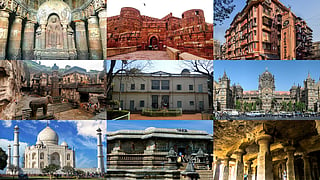
World Heritage Day, celebrated on April 18, is not just a date on the calendar but a window into the soul of our planet's rich cultural and natural heritage. This year, as we embrace the theme "Discover and Experience Diversity", our attention is drawn to the countless treasures in India and beyond, that adorn UNESCO's World Heritage list. So read on to know these 6 interesting facts about UNESCO sites, that have us planning our next trip!
India's landscape stands as a testament to its rich heritage, adorned with a remarkable array of 34 cultural, 7 natural, and 1 mixed marvels. Each cultural site showcases India's rich history while natural wonders reflect the country's ecological diversity. From lush forests to pristine coastlines and majestic mountains, you'll find it all!
India's journey with UNESCO commenced in 1983 with the recognition of iconic landmarks such as the Ajanta Caves, Ellora Caves, Agra Fort and Taj Mahal. Since then, India has continued to add to its roster of UNESCO World Heritage Sites, further enriching its cultural tapestry and cementing its position as a custodian of invaluable heritage.
A significant milestone in India's cultural heritage preservation occurred in 2017, with the recognition of Old Ahmedabad as the first Indian city to be inscribed in UNESCO's World Heritage City List. This acknowledgement underscores the historical and architectural significance of Old Ahmedabad, a city steeped in centuries of vibrant culture, trade, and communal harmony.
The inclusion of Santiniketan in West Bengal and the Hoysala temples of Karnataka in UNESCO's World Heritage list in 2023, serves as a significant addition to India's already vibrant cultural landscape. Santiniketan, the abode of Rabindranath Tagore's Visva-Bharati University, is renowned for its cultural and educational significance, embodying Tagore's vision of an institution that harmonises nature with human creativity.
The Hoysala temples, scattered across Karnataka, are architectural marvels dating back to the 11th and 12th centuries, characterised by intricate carvings and exquisite craftsmanship.
Maharashtra stands tall with a total of five UNESCO World Heritage Sites. The list includes the majestic Ajanta and Ellora Caves, the awe-inspiring Elephanta Caves, the historic Chhatrapati Shivaji Maharaj Terminus, and the enchanting Victorian Gothic and Art Deco buildings of South Mumbai.
Italy takes the lead globally, with an impressive count of 54 UNESCO World Heritage Sites. From the ancient ruins of Rome to the Renaissance wonders of Florence and the picturesque landscapes of the Amalfi Coast, Italy's cultural and natural treasures continue to captivate visitors worldwide.
To get all the latest content, download our mobile application. Available for both iOS & Android devices.